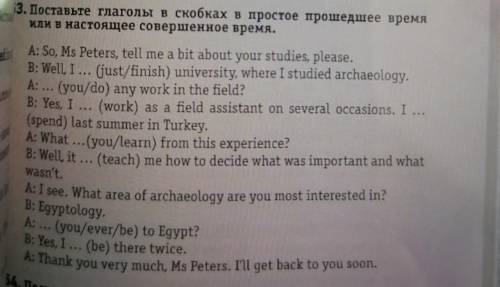13. Поставьте глаголы в скобках в простое время или в настоящее совершенное время. A: So, Ms Peters, tell me a bit about your studies, please. B: Well , I ... (just/finish) university, where I studied archaeology. A:... (you/do) any work in the field? B: Yes, I ... (work) as a field assistant on several occasions. I ... (spend) last summer in Turkey. A: What ...(you/learn) from this experience? B: Well, it ... (teach) me how to decide what was important and what wasn't. A: I see. What area of archaeology are you most interested in? B: Egyptology. A:... (you/ever/be) to Egypt? B: Yes, I ... (be) there twice. A: Thank you very much, Ms Peters. I'll get back to you soon.

Другие вопросы по теме Английский язык
Популярные вопросы
- Исправить предложение и расставить знаки препинания: радио принесло радостную...
3 - Подайте у вигляді многочлена 1) (a-6)до квадрату...
1 - Укласі 30 учнів із яких 16 дівчата. яка ймовірність того, що першим у клас...
2 - Выразительные средства в рассказе сказки пушкина к.паустовского.(эпитеты,метафоры,олицетворения...
3 - Составить предложение по схеме о , но о...
1 - Выберите повествовательное предложение( знаки препинания не расставленны...
2 - Особенности строения калины. форма корня, окраска,строение почек....
2 - Put the verbs in brackets into the correct tence of the active or passive...
2 - Какие важные наблюдения о явлениях природы включены в сказку одоевского мороз...
1 - За 1/2 метр тесьмы заплатили на 6 р. больше, чем за 1/5 м. такой же тесьмы....
2
B: Well, I have just finished university, where I studied archaeology.
A: Have you done any work in the field?
B: Yes, I have worked as a field assistant on several occasions. I spent last summer in Turkey.
A: What have you learned from this experience?
B: Well, it has taught me how to decide what was important and what wasn't.
A: I see. What area of archaeology are you most interested in?
B: Egyptology.
A: Have you ever been to Egypt?
B: Yes, I have been there twice.
A: Thank you very much, Ms Peters. I'll get back to you soon.
Explanation:
In this conversation, Ms Peters is talking about her studies and work in the field of archaeology. The question prompts her to talk about her recent completion of university, which is in the past, so the verb "just finish" should be in the past tense. The verb "finish" is provided in the past tense (finished), so it is correct to use it in the sentence "I have just finished university."
Continuing the conversation, Ms Peters is asked if she has done any work in the field. She responds affirmatively, indicating that she has worked as a field assistant on several occasions. The verb "work" in this context refers to completed actions in the past, so it should be in the past tense. The past tense form of the verb "work" is "worked," so it is correct to say "Yes, I have worked as a field assistant on several occasions."
Additionally, Ms Peters mentions that she spent last summer in Turkey. The verb "spend" refers to an action that occurred in the past, so it should be in the past tense. The past tense form of the verb "spend" is "spent," so it is correct to say "I spent last summer in Turkey."
Ms Peters is then asked what she has learned from her experience in Turkey. To talk about the lessons learned from a past experience, we use the present perfect tense. The present perfect tense is formed by using the auxiliary verb "have" (or "has" for the third person singular) followed by the past participle form of the verb. In this case, the verb "teach" is used in the past participle form ("taught") to express the idea that the experience has provided her with knowledge. Therefore, it is correct to say "Well, it has taught me how to decide what was important and what wasn't."
Next, Ms Peters is asked about her interest in a specific area of archaeology, Egyptology. Since her interest is ongoing or general, we use the present simple tense. The verb form "are" is used with the subject "you" to form the sentence "What area of archaeology are you most interested in?"
Finally, Ms Peters is asked if she has ever been to Egypt. The phrase "ever been" is used to inquire about past experiences. To answer this question, we use the present perfect tense. The verb "be" is used in its past participle form ("been") after the auxiliary verb "have." Therefore, it is correct to say "Yes, I have been there twice."
Overall, this conversation uses a combination of past and present perfect tenses to discuss past experiences and current interests.